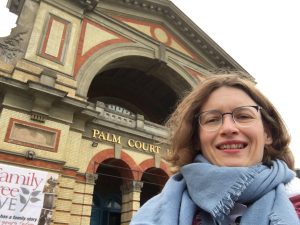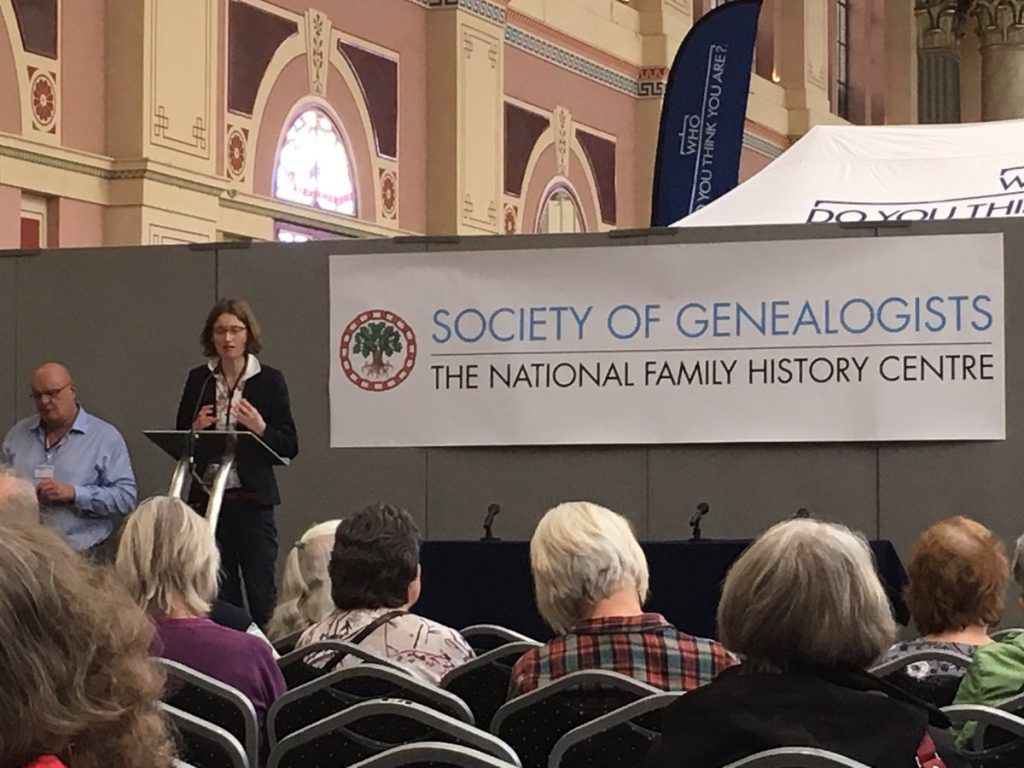On Friday 26th April 2019, Professor Nigel Hunt and Dr Larissa Allwork gave a lecture on ‘Trauma and the First World War’ to family historians attending the first ever Family Tree Live at Alexandra Palace, London (26 – 27 April 2017). At the Society of Genealogists stage and to approximately 45 audience members, Nigel explained what is meant by traumatic stress during the First World War and Larissa went through the various archives in the UK where information about trauma and the First World War might be found. After their talk, all of the information about these archives was made available to audience members through the ‘Shell Shock Stories and Beyond: Research Guide and Bibliography’, available on this website and through the ‘Lecture notes’ section of the Family Tree Live website.

Nigel and Larissa also talked about the broader history of Alexandra Palace. Alexandra Palace was a powerful place to host this talk as in 1914 it had acted as a camp for Belgian refugees before it became a civilian internment camp for Germans, Austrians and Hungarians between 1915 and 1919. Some internees reported psychological distress. An account from 1916 by Richard Perls in the National Archives reports that, “acute mental breakdown frequently occurs [among the in-mates], cases of insanity result, symptoms of many illnesses appear.” During the First World War, the Swiss physician Dr Adolf Lukas Vischer (1884-1974) was deployed by the Italian Red Cross to serve at field hospitals. He also visited POW camps in Turkey and England, where he observed in-mates, and saw recurring symptoms of boredom, confusion, amnesia and depression. Reflecting on these experiences, Vischer formulated the diagnosis of ‘barbed wire disease’. While it was not initially recognised as form of war neurosis, more recently Psychiatry and Psychology experts such as Edgar Jones and Simon Wessely have made the case that it shares symptoms with what is now known as PTSD (Post-Traumatic Stress Disorder).
Audience Feedback on Nigel and Larissa’s talk:
- “[I] Learned much more about the context and some possible research sources to find out more about my father’s treatment.”
- “The depth of the mental health issue was much more complex than I realised.”
- “Insight into the long-term effects.”
- “I was unaware that soldiers were executed for desertion or cowardice.”
- “Mention of trauma in the civilian population.”
After the talk, Nigel and Larissa had the opportunity to explore the 120 stalls dedicated to different archives and publishers, local and regional family history organisations and genealogical associations for diaspora groups. There were also other lectures and talks by family history experts throughout the day. Of particular interest to those working on the First World War were stalls by Living Military History, the Ministry of Defence, the Anglo-German History Society, and the British Red Cross Museum and Archives. Excitingly, the British Red Cross Museum and Archives has launched a new online index card collection of First World War volunteers during the 1914-1918 conflict.
A number of talks also gave lots of helpful hints and tips for family history research into the First World War. Janet Few’s talk on twentieth-century family history drew attention to the fact that post-First World War absent voters lists are now becoming available, and that these are a particularly useful source for tracing those who served and survived the 1914-1918 conflict. There was also a great talk by PhD scholar, Katy Barbier-Greenland on ‘Inheriting the Unexpected: Dealing with Unforseen Family Secret Discoveries’. Katy’s sociological research explores what it means for individuals to uncover difficult pasts as part of their family history research. These include unknown parents, hidden adoption, histories of racism or the covering up of mental health issues. If family historians discover a difficult history Katy advises that:
- If required, seek support from friends, counsellors and/or support groups.
- Where possible try and refrain from moral judgement – although there are certain circumstances where this might be impossible. People keep secrets for strong reasons and there are generational differences in relation to what is stigmatised or constructed as taboo behaviour.
- If you decide to tell other family members make sure that your evidence is robust and break the news sensitively, in private rather than at a family gathering. People often want to know the truth but don’t be surprised if there is a reaction. Even secrets from a couple of generations ago can still have an impact now.
